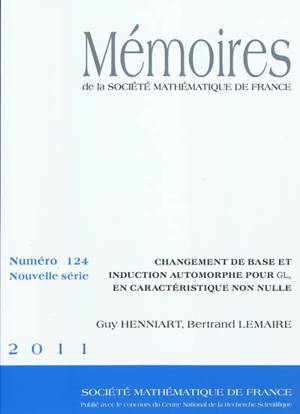
- Retrait gratuit dans votre magasin Club
- 7.000.000 titres dans notre catalogue
- Payer en toute sécurité
- Toujours un magasin près de chez vous
- Retrait gratuit dans votre magasin Club
- 7.000.0000 titres dans notre catalogue
- Payer en toute sécurité
- Toujours un magasin près de chez vous
Changement de base et induction automorphe pour GLn en caractéristique non nulle
Guy Henniart, Bertrand LemaireDescription
Soit E/F une extension cyclique de corps (commutatifs) locaux ou globaux, de degré fini d. La théorie du changement de base de GLn(F) à GLn(E) et celle de l'induction automorphe de GLm(E) à GLmd(F) sont deux illustrations du principe de fonctorialité de Langlands : pour F local, elles correspondent côté galoisien à la restriction des représentations de W'F à W'E et à l'induction des représentations de W'E à W'F, où W'F désigne le groupe Weil-Deligne de F, W'E celui de E. Si F est une extension finie d'un corps p-adique Qp, ces deux théories existent depuis longtemps (Arthur-Clozel, Henniart-Herb). On les étend dans ce mémoire au cas où F est un corps localement compact non archimédien de caractéristique non nulle. On montre aussi, pour un corps global de fonctions F, que ces deux théories locales sont compatibles aux applications globales de changement de base et d'induction automorphe déduites, via la correspondance de Langlands établie par Lafforgue, de la restriction et de l'induction des représentations galoisiennes globales.
Let E/F be a finite cyclic extension of local or global fields, of degree d. The theory of base change from GLn(F) to GLn(E) and the theory of automorphic induction from GLm(E) to GLmd(F) are two instances of Langlands' functoriality principle : when F is local, they correspond respectively to restriction to E of representations of the Weil-Deligne group of F, and induction to F of representations of the Weil-Deligne group of E. If F is a finite extension of a p-adic field Qp, these theories were established long ago (Arthur-Clozel, Henniart-Herb). In this memoir we extend them to the case where F is a non-Archimedean locally compact field of positive characteristic. We also prove, for a global functions field F, that these two local theories are compatible with the global maps of base change and automorphic induction deduced, via the Langlands correspondence proved by Lafforgue, from restriction and induction of global Galois representations.
Spécifications
Parties prenantes
- Auteur(s) :
- Editeur:
Contenu
- Nombre de pages :
- 190
- Langue:
- Français
Caractéristiques
- EAN:
- 9782856293119
- Date de parution :
- 30-05-11
- Format:
- Livre broché
- Dimensions :
- 180 mm x 240 mm

Les avis
Nous publions uniquement les avis qui respectent les conditions requises. Consultez nos conditions pour les avis.






